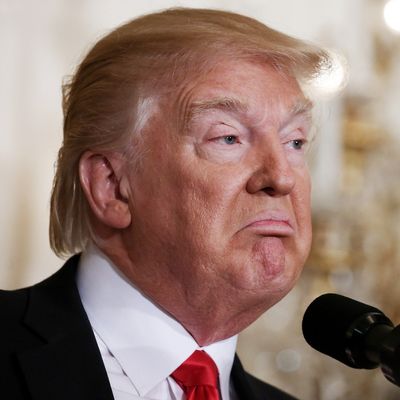
Even after the president’s rally this weekend in Florida came and went, it was difficult to grasp the fact that after just a month in the most powerful position in the world, Donald Trump was eager to get back on the campaign trail. Of all the possible explanations for this odd development, the most plausible — and alarming — is that the lack of interest in policy details that was so apparent in Candidate Trump has carried over to President Trump.
We will know for sure on February 28, when Trump addresses a joint session of Congress. As conservative policy wonk James Capretta reminds us, these first-year presidential addresses are usually the occasion for highly detailed and polished presentations of the new administration’s agenda. Bill Clinton and Barack Obama released policy tomes of more than 140 pages laying out their plans; George W. Bush’s document was 207 pages. For a politician who normally communicates in 140 characters rather than pages, that would be an astonishing feat. And it’s not like he has a large army of underlings in place who know the president’s mind and have nothing else to do but to bring order to his vague wishes. As John Nichols points out, Trump has only made nominations for 34 of the 549 positions requiring Senate confirmation. And it certainly seems the White House staff itself is juggling too much dynamite to do any deep thinking or extensive writing. Chief speechwriter Stephen Miller, for example, has been busy telling diplomats and airlines what to do with refugees and other immigrants. He probably doesn’t have time to write up an agenda, and he works for a boss who doesn’t much like to read, either.
Unfortunately, the congressional Republicans who have a lot more interest than Trump in governing the country could really use some extremely detailed executive guidance. Their plans for the year require precision timing, and nobody wants to run even the slightest risk that Trump will suddenly tweet out objections to an appropriations bill, much less one of the two giant budget-reconciliation bills designed to repeal Obamacare and cut taxes, among other big priorities. As Capretta explains, the time when rhetoric could be substituted for decisions is long past:
Trump has no choice at this point but to begin showing some cards if he wants to get anything done. The drift and paralysis that is now settling in over Washington is palpable, and it is due entirely to the lack of a clear plan. On complex issues, leadership from the executive branch has been critical in recent decades, and that is unlikely to change even with a very different kind of chief executive.
Maybe he will somehow rise to the occasion on February 28. But Trump has certainly shown no inclination to follow the usual templates up until now, judging by his belligerent Inaugural Address and his bizarre first presidential press conference. It may perhaps miss the point to talk about the man “returning” to the campaign trail. He may never have left it.
Before he took office, there was some speculation Trump might just focus on the ceremonial aspects of the presidency, or stick to a few big thematic topics, and let Paul Ryan and Mitch McConnell basically run the country. But the trouble with a narcissist in this job is that even if he refuses to use his power, he’s not about to let anybody usurp it. And if that means Congress grinds to a halt and America doesn’t get made great again in the next four years — well, that’s what a second term is for! No wonder Trump keeps campaigning!






























